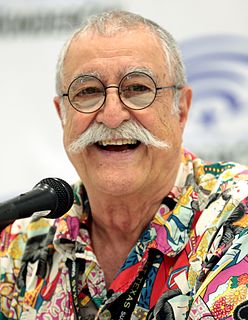A Quote by Sergio Aragones
The reason I love comics more than anything else is that the longest story will be just a few pages. With a novel, it takes so many pages to get to one thing happening.
Related Quotes
During my last year of college I wrote the same ten pages over and over again. Those ten pages became the first few pages of my first novel. I can still recite the opening paragraph from memory - only now I cringe when I do it because they are - surprise! - a classic example of overwriting, in addition to being a more than a little pretentious.
Twenty-two pages is not a lot of space. Believe me. Having written a bazillion comics, I still find myself more often than nine pages into a script and realizing to my horror that I'm only about a quarter of the way through the story I wanted to tell, and the next thing you know, I'm making fresh coffee and tearing up the floorboards to rewrite.
I'm so used to artists saying to me, "Listen, I'm going to have five pages done next week," and then three weeks later I'm phoning them, begging them for two pages. And Stuart [Immonen]is a guy who will promise you five pages and deliver six pages, and the six pages are even better than you could have ever imagined.
You're able to use a search engine, like Google or Bing or whatever. But those engines don't understand anything about pages that they give you; they essentially index the pages based on the words that you're searching, and then they intersect that with the words in your query, and they use some tricks to figure out which pages are more important than others. But they don't understand anything.
I try to weave a secret into each plot. It's the thread that holds the rest of the story fabric together. In fact, it's the reason for the story. I hint at the secret early on. Immediately I want the reader to get the feeling that something here isn't quite right. It helps maintain the suspense if a puzzling element is introduced in the first few pages of the book, but the answer isn't revealed until the final ones. Hopefully, readers want to know what the heck is really going on, and it's the desire to find out that keeps them turning pages.
If you can stand to wait 24 hours before you decide the fate of what you have written - either good or bad - you're more likely to see that invisible thing that is invisible for the first few days in any new writing. We just can't know what all is in a sentence until there are several sentences to follow it. Pages of writing need more pages in order to be known, chapters need more chapters.


































